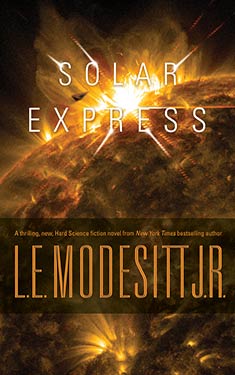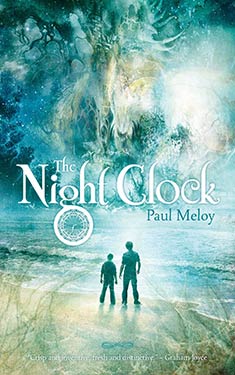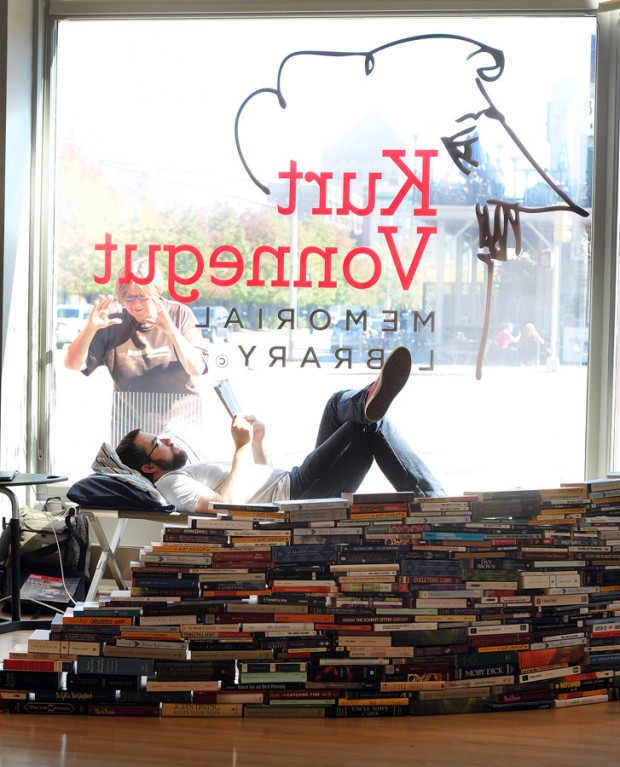Science Fiction Book & Magazine News – 5/16/16
Two science fiction books grabbed my attention in the last couple of days while reading News360 and FlipBoard:
Too Like the Lightning – Ada Palmer
- “Too Like the Lightning: intricate worldbuilding, brilliant speculation, gripping storytelling” – Cory Doctorow
- “A Future Worth Having: Ada Palmer’s Too Like the Lightning” – Jo Walton
- “An interview with Ada Palmer, author of Too Like the Lightning” – My Bookish Ways
- “Science, Fiction And Philosophy Collide In Astonishing ‘Lightning’” – NPR
- Listen to the Audible sample to see if you can resist.
Central Station – Lavie Tidhar
- “Brilliant ‘Central Station’ Is Rich With Detail and Mystery” – NPR
- “Lavie Tidhar’s novel Central Station is a mosaic of posthuman problems” – ARS Technica
- “Gary K. Wolfe reviews Lavie Tidhar” – Locus Online
- “Literature’s Task Is To Pose Alternatives To Political Reality” – +972 Mag
Hundreds of science fiction books are published each year, but only a few jump out like this.
One of the odd side-effects of reading my news off of curated news apps is being directed to publications I’ve never heard of before. Take this piece from Intellectual Takeout, “Science Fiction: Why So Many Intellectuals Despise It.” This essay seems out of time, like maybe the 1950s. It defends science fiction, by reminding us of the prejudice against it. But do modern intellectuals still feel SF is worthless? But then I also saw this, “Harry Potter Causes Brain Damage, Says English Headmaster Who Is Clearly Voldemort In Disguise.”
I am reminded of an article I read decades ago that claimed librarians in the 1950s banned the Oz books by L. Frank Baum because they felt young readers picked up unrealistic attitudes towards life by reading them. I know I read the Oz books when I was a kid, and I’ve always had unrealistic attitudes toward life. Could these people be right? Then I read, “’There is just no such thing as God’: A physicist searches for meaning in the natural world,” a review of Sean Carroll’s new book, The Big Picture: On the Origin of Life, Meaning, and the Universe Itself. Are all of these folks just saying that lovers of science fiction, fantasy and religion are ignoring reality? There could be some truth in that. I know I do. But I am trying to break that habit.
Another critical examination of our genre came via The Guardian, a paper I like very much. “Sci-fi media coverage dominated by men, survey shows.” The article is based on the VIDA: Women in Literary Arts’s 2015 VIDA count. This is a gigantic demographic effort that examines race and ethnicity, sexual identity and ability in the top tier of periodical publications. Within the science fiction field they reviewed 18 publications and counted the number of books reviewed, and then did identity statistics on the authors of books reviewed and the reviewers to show how many were written by women, non-binary people and people of color.
This is an excellent article to read, but I’m not sure how they are going to solve their problem. I’m an old white male, writing about science fiction, which is their problem. My demographic traits are too common. I would assume Dave would be happy to find more writers for Worlds Without End that weren’t white and male. I used to work in computers, and we were always trying to get more female programmers. For a few years the number of women going into computer science grew, but then it dropped off. There should be more diversity everywhere, and I think everywhere is getting more diverse, but to administratively create it is difficult.
By the way, I recommend reading that article to see what are the top publications reviewing science fiction. If you aren’t a white guy, go write for them. I feel bad folks of my gender and color hog all the jobs, but I’m not sure what to do about it. I do try to read and review books by people not like me. I hope that helps.
Who Can Replace SF Signal?
The popular science fiction site, SF Signal closed it’s doors May 5th. There are many great sites on the internet devoted to science fiction, but I usually didn’t visit them unless SF Signal directed me with a link. I was lazy, depending on SF Signal to curate content for me. I’ll need to go elsewhere now for the two main functions I found so useful: news about science fiction books, and links to classic science fiction ebooks on sale. Their site provided immensely more content, but those two functions are what I’ll miss.
Other fans of this very useful site are going to miss SF Signal for other reasons. I’ve been wondering how many sites we’ll have to visit each day to make up for our loss. Now, don’t get me wrong, I’m not trying to bum out John DeNardo and crew because they left us. I understand, after almost thirteen years of relentless work they deserve a break. I just wonder who might provide some of the tasks they did so well. This would be a great time for a young person to jump in and start a site.
I’m going to mention just some of the locations I’ll have to visit to keep up with just the content I got from SF Signal. If you use programs like Feedly for RSS feeds, you could cobble together something like the daily “SF/F/H Link Post” – but it will require a whole lot more scanning time. I often saw many of its daily stories come through on News360 and FlipBoard, but never anything like all of them.
First, and foremost, I believe writers and publishers are going to miss SF Signal the most. SF Signal was great at promoting new novels, collections, anthologies and magazines. It’s daily “SF/F/H Link Post” was one-stop shopping for all the news about science fiction, fantasy and horror books, as well as media related news. They began the list with links to interviews, which I’m sure help new writers get noticed. They also published long lists of forth coming books and books received, published book reviews, and linked to books reviewed. Their regular feature “Mind Meld” let readers and writers reference older books that need remembering. All of this was a goldmine for book promotion. Here are some good sites to follow to keep up with the science fiction book world.
- Locus Magazine
- io9
- Tor.com
- Science Fiction.com
- SFBook Reviews
- SFFWorld
- SciFiNow
- File 770
- SFWA
- BookRiot
Of course SF Signal also covered movies, television, games, and other related media, as well as the fantasy and horror genres. My focus is SF books, so lists of alternate sites will have to be much longer if you want cover all the territory.
After the news, the thing I’m going to miss most are the list of bargain ebooks. I’ve built quite a library of classic science fiction books on my Kindle with SF Signal posts like “200+ SF/F/H eBooks for $5 Each or Less.” Not only did I love snagging old favorite books I read as a kid for $1.99, but I really enjoyed seeing all the book covers. It was rows of three with the sale ebooks, but larger rows of two, in the Books Received section. Take a look at the January-June 2016 list, and tell me you don’t like seeing the covers? Isn’t that a wonderful way to shop for books? I don’t know any site that takes the time to link to so many covers. I could go to my favorite bookstore and pull books off the shelf one at a time to look at covers, but this feature makes the job much easier.
I asked John how he tracked down all those book deals and he sent me these links:
Even subscribing to all of these daily newsletters of book bargains, they don’t provide the convenience of that SF Signal did with their sale posts. And that must have been a tremendous amount of work creating all those links
I hope some enterprising young person sets up a web site that offers just these two features. Links to all the great stories about SF/F/H on the web that comes out each day, and links to all the sale ebooks for SF/F/H. Actually, I’d be happy with a site that just focused on science fiction. But even narrowing the work down to one genre, it would probably take several hours a day to keep up with the task. Can you imagine doing that for thirteen years?
Web sites come and go. Especially ones that are essentially labors of love. Sure you can make money off the web, but it’s hard. Corporations with large bankrolls struggle every day. I hope SF Signal finds someone to host their archive, because I’d hate to see all that effort disappear. But I do think we’re seeing an interesting dynamic on the internet. The net has been around long enough for sites we once assumed would be there forever to disappear. I’ve known a number of folks who have burned out. I’m not sure users of the net understand the kind of work that’s involved with maintaining useful web sites. We have to salute the crew at SF Signal for working so hard for so long. (Long enough to attend kindergarten through high school graduation.)
Bandersnatch – Lewis & Tolkien as Writers in Community
 I’ve got to start with a misconception that people who don’t know artists or other creative people often have. Many people think that the creative process starts and ends in the space between the artist and the work. That is, in that space between the blank page and the writer, the blank canvas and the painter, or the raw stone and the sculptor. This is only partially true and this partial truth gives rise to the myth, yes Myth, of the writer in a lonely garret, the Eiffel Tower in the background, out the window. Yes, in that space is where everything collides in the struggle right then and there to create, but any artist will tell you that this point is only 50% of the process. (Some say more, some say less.) There is a wholly different side to the creative process which those who don’t know artists, know nothing about.
I’ve got to start with a misconception that people who don’t know artists or other creative people often have. Many people think that the creative process starts and ends in the space between the artist and the work. That is, in that space between the blank page and the writer, the blank canvas and the painter, or the raw stone and the sculptor. This is only partially true and this partial truth gives rise to the myth, yes Myth, of the writer in a lonely garret, the Eiffel Tower in the background, out the window. Yes, in that space is where everything collides in the struggle right then and there to create, but any artist will tell you that this point is only 50% of the process. (Some say more, some say less.) There is a wholly different side to the creative process which those who don’t know artists, know nothing about.
That is Bandersnatch: the other side where creativity is forged in the crucible of fellowship.
In terms of the 20th century, the Inklings, this select group of men, who met, talked, and critiqued each others work, has now become The Example for how a fellowship is supposed to work. Even Paris of Hemingway’s lost generation, with their salons, and creative minds from far more disciples, seems now a pale second place.
Bandersnatch takes us into this crucible, trying to reconstruct from a fly-on-the-wall perspective this extraordinary time and place. Glyer is concerned with two fundamental questions: What did they talk about when they discussed the various works in progress? and What difference did it make within the books they were writing?
These are simple but seemingly unanswerable questions. Until now, of course. It is positively amazing what a determined scholar can find, especially going into a headwind of opinion from friends, mentors, teachers, that these questions Can Not be answered, so one shouldn’t waste one’s time trying.
Thank goodness she didn’t listen to those little minds. The end result was the book The Company They Keep: Lewis, Tolkien as Writers in Community. Bandersnatch then is not the Good Parts version, the dumbed down for a general audience version, nor a more intimate treatment with the author as narrator version, although all three facets do come into play. Think of Bandersnatch as a distillation with an eye on bringing the practice, that is, the wisdom of The Inklings, into our own lives as creative people.
What did they talk about? What difference did it make? The answer is everything and the other answer is that it made a huge difference. You’ll have to get the details from the book!
For me, the book highlighted not just the critique part of fellowship, but also the resonating aspect, that is, someone who gets it like you get it. If, say, two anime Otaku (obsessed fans of Japanese animation) get together and one of them says “SAO” that’s all they need to engage in a 40 minute conversation concerning the minutia of “SAO” that is as incomprehensible to an outsider as if the outsider was listening to two astrophysicists. From what Glyer has gleamed from The Inklings and from a lot of current research and thought on the subject, this resonating aspect by itself is huge, in terms of creativity.
Glyer goes on to illuminate a half dozen other forms of feedback within the fellowship and what effect it had on the individual writers and their work. She also, fortunately or unfortunately, illuminates what ultimately sunk their ship: what went wrong and why it was their undoing. This, of course, should be a lesson for our own creative process.
If you are a Lewis or Tolkien fan, what are you waiting for? Go and get this book. If you don’t care for those two but the issues surrounding creativity, or writers in general are of interest, this book offers plenty for you as well.
Highly recommended.
Solar Express – Three Views
 A Futurist, a UFO researcher and a SF guy all walk into a bar carrying read copies of Solar Express. They sit down and get their drinks.
A Futurist, a UFO researcher and a SF guy all walk into a bar carrying read copies of Solar Express. They sit down and get their drinks.
SF: Well, what do you think?
They look at each other. No one says a thing for a few moments.
SF: That bad?
F: Well… I’m trying to think of something nice to say.
UFO: Don’t bother.
F: The man knows hard science but he knows jack about Futures.
SF: Is he supposed to? Would it help the story?
F: It would be nice if a major SF author knew a little bit of Future Studies. Just the basics, mind. I don’t think that’s to much to ask. But this, hell, this is the worse kind of SF. The stuff I can’t stand.
UFO: Here, here.
F: He simply runs a few of today’s trends out, establishes his baseline and then that’s it. A few trends do not a future make. What about all the other trends and how they interact with the trends he’s using? Nothing. Besides, it’s never the baseline.
SF: Is that a Futures’ secret?
F: No it isn’t. It’s what they teach first day. When you run today’s trends out, you get the baseline, but the answer you’re looking for is never the baseline. I’d be shocked if it was.
SF: So you don’t like his world construction.
UFO: Pathetic.
F: Exactly. There’s no change. His politicians are jackasses, the politics are so brazenly normal it’s shocking. Post-docs as wage slaves, on the back side of the moon. (Disgust noise.) At least the background glimpses of the society we got in Clarke’s Rama were different.
SF: That’s hardly being fair.
UFO: That’s life.
F: Let’s just say you were reading something from a hundred years ago or so, something Victorian. And they made a big deal about a woman not being a virgin….
SF: Isn’t that a plot point in Tess… something…
UFO: D’Urbervilles. Yeah, it was.
F: Fast forward a hundred years or so to us, and that doesn’t mean a thing. Victorian lit’ is quaint. Human, certainly, but quaint, and concerned with things we don’t care about. And we’re supposed to believe that there’s been no changes like that in the hundred years out to the time of the novel? I think it makes for very uneven reading.
SF: But that really wasn’t the point.
F: Point or not, the fact it’s not there, not even really considered, is important. The society in which this novel is set, is an important point, but he is either not interested in talking about it or does not have the talent to talk about it. What we get is a blasé “they’re just like us” and he moves on to com’ chatter between a shuttle and station control.
SF: That did get a little repetitive, didn’t it? That and the intricacies of station repair. Life and science in space can be quit tedious. So… what else?
UFO: From my perspective, the whole thing was based on a faulty premise. They’re here. The best minds in the field think they’ve always been here. And it’s only Human arrogance, stupidity and lies that we believe otherwise.
F: Now who’s being harsh?
UFO: He’s in a cul-de-sac. Especially a technological one. The way he talks about space travel is quaint.
SF: Quaint?
F: His expression of space travel is a projection forward from the Now, but if the Now is based on a lie or faulty data, then the projection forward is useless. It can’t be a useful baseline if it’s based on faulty data. It’s gibberish.
SF: What’s the lie you mentioned?
UFO: We’ve known since the 50’s that you can go into a lab and break all three of the so-called Newtonian laws. Period. This mean they’re not laws of any sort just approximations of reality under certain conditions. Change those conditions enough and these so called laws stop working.
SF: Ouch.
UFO: Since the government has know that for close to 70 years, space travel as we know it from NASA is a dog ‘n pony show for the rubes. The lie is, that’s the way it has to be.
SF: And we’re the rubes.
UFO: Exactly. The lie covers the existence of what can be called the technology of the gods. We barely survived the nuclear era with that level of technology. Do you really think we could survive “the death star has cleared the planet” levels of technology?
F: The lie is a good thing then?
UFO: Hell no.
SF: So, we’ve got faulty premises and a background society that’s just like us…
F: And M.A.D. too.
SF: Mutual Assured Destruction. Tediousness at times. What else? I’ll add that there were passages that I got bogged down in with all the science and techno babble.
UFO: I thought the arc of the story itself was really obvious. I kept waiting for something to pop up that wasn’t what I expected. I wasn’t expecting monsters or any dribble like that but… you know… observation, mission, solve some problems, get back safely, win the girl and a medal. No surprises.
F: I thought the relationship between those two was… quaint. Almost like something out of the 19th century. They wrote long letters of encouragement to each other. How nice and romantic. That just strikes me as unrealistic. We’re a hundred years out. Moore’s law for computation power seems to have stalled or slowed precipitously. Hell, IBM’s Watson is practically on the level of the COFAR M.I. today. And everyone seemed to have skimped on bandwidth for reasons which seemed either lame or nonexistent.
SF: We’re back to world construction from the trends.
UFO: And those Hotnews! summaries. They reminded me of Ruby Rhod from The Fifth Element.
F: Yeah. Him. If that’s where Humanity gets it’s news, no wonder that society was M.A.D.
SF: That’s scarcely a criticism since the same can be said of our own.
F: I actually thought that stuff was quite tame. Compared to what one might get if you ran today’s crap that passes for news forward by a century.
SF: I liked the quotes.
F: But they’re so applicable to our own society as well.
UFO: That can’t be much of a criticism since one can read the political musing of Cicero and they’re equally valid.
SF: Do we know if he made those quotes up, like Herbert did all the time, or did he get them from somewhere? I assumed he did the Herbert thing. It’s a writing technique I’ve always liked.
F: No idea.
UFO: I assumed it was the author speaking to us through the quotes.
The conversation stalls for a moment as another round of drinks is brought over.
SF: I think we’re being a bit harsh. Isn’t there anything to like in this book?
F: That, I think, is the real problem. It’s solid work, if you just read it and that’s it.
SF: In the moment, it’s fine. But once you start picking at what he’s doing and why, it comes apart.
UFO: You’d have to discount fundamental scientific advancement being in a cul-de-sac since Einstein.
F: And discount the inconsistent use of the trends in your world building…
SF: Nothing memorable about the characters either…
UFO and F glance at each other, knowingly.
F: You’re not going to bring Gally into this are you?
SF: I was not. That’s really not fair. But a fairer comparison would be there’s no Paul Maud’Dib, no Sylia Stingray, no Hal 9000, no Major Motoko Kusanagi, no Deckard. There’s no one here I’m going to remember beyond next Tuesday. No one unforgettable.
F: What’s the name of the captain who leads the team onto the ship in Clarke’s original Rama book? Don’t…
F points at UFO who was about to answer.
SF: I don’t remember.
F: What’s the plot for that book?
SF: Space ship comes cruising in to use the Sun for a gravitational turn. An Earth ship can intercept, so it does, dead silence and alien stuff. Happy endings for first contact; no fatalities. Ship leaves them in the stellar dust.
UFO: The humans in that story seemed saner? more intelligent? less fracked up? than this story.
F: Less petty. But the point was, you don’t remember the fine details of Rama, so you won’t remember the fine details of this either. But a one sentence summery in 20 years? Probably. Like I said, it’s solid work, if you don’t think about it.
UFO: Safe too.
F: Very safe. It’s works on the assumption that we’re just going to teeter along, creating and solving our problems, just getting by, muddling through like we’ve always done. That is a highly dubious assumption.
UFO: And there’s that bullheaded drum beat about how far away other civilizations are, and not going faster than light speed, and why would aliens bother with this backwater. Hideously stupid.
F: Those three things are all assumptions.
SF: And if all three are wrong…can one write great SF?
F: I don’t think so. You can write solid and safe but not great.
SF: Because greatness usually breaks molds, upsets apple carts, and goes places never gone before.
UFO: Can’t accuse this book of that. (Laughs.)
They grow quiet for a moment, finishing the current round of drinks.
SF: We’ve not even skirted around the big lie which sets the book in motion.
UFO: You cannot militarize space. Bull.
SF: The minute I read that statement, which was right after the back cover of the book, I thought we were already in trouble. Another quaint idea.
F: Another assumption about how the world works which, unfortunately, isn’t true.
SF: We’re all adults here. We know N.A.S.A. was incorporated under the D.O.D. which mean anything they do…
UFO: Or find…
SF: …can be classified under national security concerns. That’s how it always starts.
UFO: The Snowdons of the world aside…
F: The exceptions which prove the rule…
UFO: …you can keep secrets. And there are many many secrets in this country.
SF: It seems to me you can militarize space all you want, you just can’t tell anyone, publicly acknowledge that you’re doing it.
UFO: Plausible deniability. Exactly. You need secrets being kept, black projects up and running, with compartmentalization of those projects.
F: Oh my, none of that around here.
UFO: And boatloads of money.
SF: How many times has a D.O.D. head made the trek up the hill in the last 30 years and said…(In a passable Goofy voice) Garsh, hyuk, we seem to have misplaced several trillion dollars. Hyuk.
UFO: More than once.
F: If we have secret space stations…
UFO: Or bases on the moon…
F: Who’s going to know it in the civilian population…? And spill the beans…? And be believed…?
SF: Still, it’s a nice idea.
UFO: I’m too old for nice ideas. Democracy is a nice idea too.
SF: Let’s definitely not go there. That certainly wasn’t part of the novel. I’m really bothered by a feeling that for all our harping, I think you’re right. It’s a solid novel.
F: Except for…
SF: Except for everything which we don’t like about it. I finished. Does that count?
UFO: Do you want a reward? Milk and cookies, perhaps?
F: I see no contradiction in the idea that a solid work can also be complete B.S. Yes, it is forgettable, isn’t it?
SF: Only a handful of books published each year, or maybe each decade, have any staying power at all as the generations pass.
UFO: This isn’t one of them.
SF: So, are we agreed? Solid, Safe and Forgettable.
After a pause, they all nod. They get up to leave.
SF: I’m off to sell my copy.
F: I’m just going to donate mine to the YWCA’s used book sale.
UFO: I have a plant stand that needs a support under one leg….
SF: I thought you’d give it to one of your friends upstairs.
UFO: That’s were I got mine originally. Some of them read a lot.
They all laugh before dispersing into the night…
NEW RELEASES: The Night Clock by Paul Meloy
 I had this as an advanced reader’s copy through Net Galley, and I went into it knowing nothing of the author or the plot. I don’t know, however, that much prior information would have helped me with the first couple of chapters. Meloy dumps us into a netherworld where the planet Mars takes the place of the moon, and characters I sensed were the good guys kept to their side of the street while a pub across the way served as a passageway for very bad things to enter their world. The next chapter involved a farm house bothered by a zombiefied relative who ate hot stew with his bare hands, had to be led away on the tines of a pitchfork, and set on fire in a field.
I had this as an advanced reader’s copy through Net Galley, and I went into it knowing nothing of the author or the plot. I don’t know, however, that much prior information would have helped me with the first couple of chapters. Meloy dumps us into a netherworld where the planet Mars takes the place of the moon, and characters I sensed were the good guys kept to their side of the street while a pub across the way served as a passageway for very bad things to enter their world. The next chapter involved a farm house bothered by a zombiefied relative who ate hot stew with his bare hands, had to be led away on the tines of a pitchfork, and set on fire in a field.
It took me several pages into the next sequence to realize that Meloy was settling down to his plot. A housing estate somewhere in the UK, with its boarded up shops, council flats, graffiti-covered walls, and threats of violence suggested a dystopian, post-apocalyptic setting, but no, this is just a miserable place to live. Meloy can really pack in the information. With the background of a mass shooting at a day care center, he introduces us to a feckless estate patrolman, an alcoholic hanging onto some sense of dignity, and a social worker whose cases have begun to either kill themselves or others. And there are monsters, hideous creatures that can possess the weak and pursue those who might be a threat to them.
Meloy has worked as a psychiatric nurse, and this section grounded in the world of the housing estate, with his hero Phil Travena dealing with suicidal and homicidal clients, a weaselly new boss brought in to “tighten the ship,” drunks and a growing sense that these monsters may not be hallucinations sets the action in both a very real and very creepy world. Once we are part of the pitched battle between good and evil, things take on the more predictable cast that such battles usually entail. But Meloy continues to create inventive situations, engaging characters, and grand set pieces. His monsters are spectacular creations that wear their debt to Lovecraft lightly. The talking animals are a problem, but that could be my inherent resistance to talking animals.
Much of the plot involves the impending birth of Chloe, a child whose existence is crucial to victory over the dark forces. In one of Meloy’s most successful narrative devices, we get to know Chloe as an adult character, stranded in a dangerous world as she waits to be born. There are also a man and his son who start as characters in a children’s book who become major players in the battle.
At times I felt that Meloy’s story needed a larger canvas than he provides, but when I weighed that against his ability to wrap things up as quickly as he did, I decided he made the right choice. He ties things up well. That illogical zombie scene from the first pages even makes sense by the time the story is over. And although he doesn’t end with cliffhangers, Meloy could easily return to this world for further novels.
Alpha Scholarship Drive: The Future of Science Fiction is in Your Hands
FOR IMMEDIATE RELEASE
March 10, 2015
THE FUTURE OF SCIENCE FICTION IS IN YOUR HANDS!
Writing genre fiction can be a lonely business for teens. The Alpha SF/F/H Workshop brings together young writers, aged 14 to 19, for ten days of creation and peer review critiques. At the end of the workshop, students leave with new skills and a vibrant network of support.
Alphans have published in dozens of markets, including Lightspeed, Clarkesworld, Analog and Strange Horizons. Many of them have placed and won in contests such as The Dell Magazine Award, Writers of the Future, and the Scholastic Art and Writing Awards.
Tamora Pierce, author of young adult series such as Protector of the Small and The Provost’s Dog, has instructed at the workshop every year since its inception. This year, instructors include Ellen Kushner, author of the beloved Riverside books recently adapted into an award winning Audible series, Delia Sherman of Freedom Maze fame, and two-time Andre Norton Award-nominated Alaya Dawn Johnson.
Alpha works hard to keep costs low–every staff member is a volunteer, and the tuition is kept at the lowest possible level–but prospective students often require financial aid. This year–as they have for the past several–alumni have contributed writing and art to an illustrated flash fiction anthology and offered it as a donor reward in the entirely alumni-organized scholarship fund drive.
The Alpha alumni fundraiser will run March 17-26. Would you consider giving us a signal boost? Donations really do change the course of our young writers’ lives.
To learn more about the Alpha SF/F/H Young Writers’ Workshop, please visit the Alpha website, and check out our latest video, featuring interviews with Bruce Coville and Tamora Pierce.
For more information please contact:
Publicity Coordinator Lara Elena Donnelly
(502) 812-9158
lara.3lena@gmail.com
There you have it folks. Your donation will help these youngsters become the kind of writers you want to read. A worthwhile cause that you can support and even benefit from down the line.
As a further incentive all donors receive the Alphanthology, a PDF anthology of flash fiction written, illustrated, and edited by Alpha alumni. Surely that’s worth a sawbuck? Check out the Alpha site for more details and to make your donation today!
Talk about your guilded cages…

Every year, the Freedom to Read Foundation awards several grants from the Judith F. Krug Memorial Fund in order to recognize outstanding work in raising “banned book awareness.” One of this year’s winners was…
The Kurt Vonnegut Memorial Library, in the historic Emelie Building in downtown Indianapolis, was one of seven organizations nationwide to receive this award. It’s the first institution devoted to an individual to receive the grant.
The grant is in response to Corey Michael Dalton’s stunt, which involved living a week in a cell made of books. Here’s how the event was described at the time:
Dalton will find himself, beginning Sept. 30 at noon, living 24 hours a day in a makeshift cell abutting the library’s front window, surrounded on two or three sides by walls made of banned books. The week-long stunt is tied to both Banned Books Week, a national venture celebrating its 30th anniversary this year, and to the Vonnegut Library’s efforts to bring attention to a partial ban of Vonnegut’s Slaughterhouse-Five by a Missouri school district.
We reported on the Vonnegut ban at the time it happened, and again when it was partially rolled back. Like most bans, this one created a lot of energy in support of the banned author. Such is the irony censorship.
Fahrenheit 451 in Less than 3 Minutes
Check out this awesome three minute video that explains Ray Bradbury’s science fiction classic Fahrenheit 451 from Academic Earth. It was created as part of a series of original videos designed to spark intellectual curiosity and start a conversation. If you like this one, you can see the other videos in the series, including one for Atlas Shrugged, on the Academic Earth website.
Our thanks to Jack Collins, one of the creators of the series, for sending us the link. Well done, Sir! I hope we’ll see more of these in the future.
The Coming Future of Sci-Fi in Prose and Film

Flux capacitor, check. Cathode tubes, check. Smoking jacket and smokes, che– they passed WHAT laws in the future?!
There were two very interesting articles in recent weeks about the future of science fiction in novels and in movies. The first piece about novels is largely speculative. It’s from The Irish Times, an article titled “The new future of sci-fi” by sci-fi novelist Gareth L. Powell:
Unlike previous movements in genre fiction, this nameless assemblage [of writers] doesn’t appear to be reacting against anything. In fact, their work displays a genuine love for what has gone before, and an appreciation of the roots and peculiarities of genre fiction.
Recently, it’s become fashionable to agonise about the Death of Science Fiction, and hardly a week passes without some commentator declaring its demise. But rather than bemoaning the moribund state of fantastic fiction, or trying to distance themselves from the old guard, these new authors are instead building on the achievements of the past, and warping them into new and unexpected shapes – producing unique, individual works which can only breathe fresh strength and vitality into science fiction and fantasy.
Another piece that caught my attention is Alex Billington’s editorial “A New Era of Sci-Fi is Upon Us – Looking Ahead to Worlds That Await,” which includes an opinion section on the best sci-fi movies of the last five years, and a look ahead at scheduled or in-production films coming soon. An excerpt:
Over the last few years, movies like Cloud Atlas, Chronicle, Moon and District 9 have proven to audiences and other filmmakers that taking a risk with bold, unique ideas can pay off. Maybe not pay off financially, but cinematically at least. The fact that films like Looper and Attack the Block were even made, got released in theaters, built substantial buzz, and nurtured large fan-bases shows that love for intellectual, entertaining sci-fi is still rampant. Audiences are ready to embrace science fiction that is challenging and exciting and not just another remake. Yes, we’ve got more Star Wars, Star Trek, Transformers and even Godzilla on the way, but for each of those we’ve also got original ideas like Gravity, Pacific Rim, Oblivion and Elysium, too.
The future of sci-fi storytelling may not be as weird as some of the stories themselves, but things are surely looking good for the ol’ genre.



















 Full Details
Full Details










